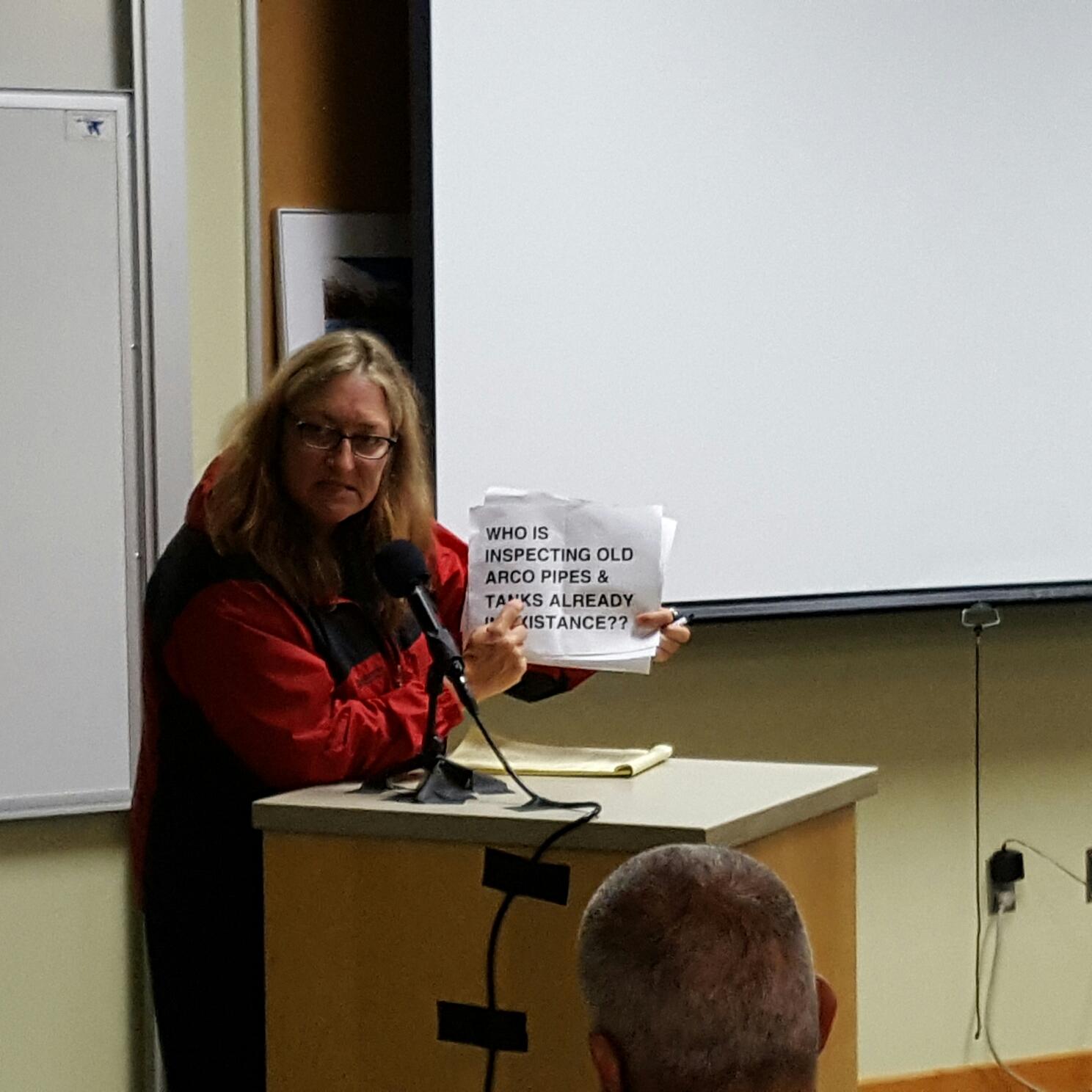Dozens of Homer residents attended the public hearing to learn more about the proposal to lease portions of Cook Inlet for oil and gas drilling.

(Photo by Shahla Farzan, KBBI – Homer)
Many who testified voiced their concerns about the environmental impacts of drilling in Cook Inlet. Homer resident Carla Stanley was one of them.
“We all know that Kachemak Bay is a critical habitat area. And those words mean a lot to me. Critical habitat,” Stanley said.
The proposed lease sale encompasses 224 separate blocks of the outer continental shelf in upper Cook Inlet. That’s just over one million acres.
If approved, the lease sale would occur in June 2017. Interested companies would then bid on rights to explore, develop and eventually extract oil and natural gas.
Before such a lease sale can take place, by law, it must go through an environmental analysis, which includes public testimony. The Bureau of Ocean Energy Management, or BOEM for short, is in charge of the process.
Over the last several weeks, BOEM officials have held hearings in Anchorage, Homer and Kenai to get feedback on the draft Environmental Impact Statement.
Although the proposed drilling area is to the north of Kachemak Bay, residents are concerned it could impact the entire marine ecosystem. After all, some residents, like Robert Archibald remember problems with past drilling.
“I came up to Alaska in 1965 on a supply boat for oil companies in Cook Inlet. I’ve seen the good, the bad, and the ugly. I was the supply boat for the George Ferris. That was ugly,” Archibald said.
Although it happened over forty years ago, the George Ferris oil spill remains firmly entrenched in the minds of many Kenai Peninsula residents.
In May 1976, the jacked-up rig became stuck in the mud near the Homer Spit. It eventually tipped over, spilling oil into Kachemak Bay. The spill became a catalyst for the state of Alaska to buy back oil leases sold in the bay.
Archibald also expressed concerns over the extensive infrastructure that would accompany drilling operations in Cook Inlet.
“It’s not just going to be a platform, it’s going to be the infrastructure to go with it. You’re talking pipelines, you’re talking ships, you’re talking tanker traffic,” Archibald said.
Deborah Limacher, 40-year Homer resident and commercial fisherman, also remembers cleaning up messes left by energy companies.
“I’ve lived through the oil spill in Cook Inlet in 1987,” Limachar said. “I worked with Exxon to clean the tarballs that travelled up into the inlet in the 1989 Exxon oil spill.”
Mark Storzer, BOEM’s Regional Supervisor, says that he realizes residents are concerned about a large spill like that of the Exxon Valdez.
“That’s a catastrophic event. The likelihood of that happening is very small, but obviously it is very impacting when it does happen,” Storzer said.
According to BOEM’s Environmental Impact Statement, the likelihood of a large oil spill in Cook Inlet over a forty year period is 22%. A “large” spill here is defined as 1,000 barrels or more.
John Callahan is a spokesman for BOEM. He says that the term “large” is misleading.
“When you talk to someone about a ‘large’ oil spill, they’re going to imagine something like the Exxon Valdez, which spilled something like 260,000 – 900,000 barrels of oil,” Callahan said.
But for the majority of residents who testified at the public hearing in Homer, an oil spill of any size is cause for concern.
Dora Coen said she’s also worried about impacts of drilling on wildlife.
“They’ve only considered some species, but there are thousands of species in Cook Inlet and the Bay… and they don’t have a voice. So, on behalf of every living creature, I say no,” Coen said.
The public hearing took place on August 17 at Islands and Ocean Visitor Center in Homer.
The Environmental Impact Statement for the Cook Inlet Lease sale can be found online at www.boem.gov/ak244. Comments on the proposal can also be submitted here.
The 45-day public comment period ends this Tuesday, September 6.
Shahla Farzan is a reporter with KBBI - Homer.
Shahla first caught the radio bug as a world music host for WMHC, the oldest college radio station operated exclusively by women. Before coming to KBBI, she worked at Capital Public Radio in Sacramento and as a science writer for the California Environmental Legacy Project. She is currently completing her Ph.D in ecology at the University of California-Davis, where she studies native bees.
When she's not producing audio stories, you can find Shahla beachcombing or buried in a good book.




